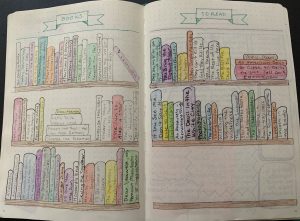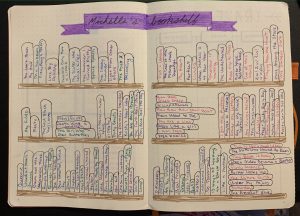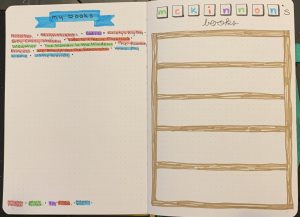What did I read last week? What was my favorite book of 2017? When did I read "My Ántonia?"
Chances are, you have been consuming media at above-average amounts and rates. Whether in the form of books, TV, movies or podcasts, these might be questions you are asking yourself. So, how are you tracking everything?
I reached out to OPL staff members to see how they track their reading habits.
By far, most staff members are on the Goodreads, opens a new window train for their reading tracking. The majority claim the ease of use as the main reason they gravitated to this platform. The site is very handy for tracking series, for instance. Laura Evans, collection processing clerk, appreciates the social aspect of the site. “I particularly love the update progress function. It's a silly positive reinforcement that kinda ‘gamifies’ reading (as if it wasn't already so fun!)” Librarian Martha Grenzeback is a fan of the review feature on Goodreads. “I get lots of ideas from other people's reviews, and my own reviews remind me of what I liked or didn't about a book--as well as the fact that I actually read it. Surprisingly, some books have completely faded from my memory, but my review is proof I read it,” said Grenzeback.
Libib, opens a new window is a website and app that catalogs books, movies, music, and video games. Library Specialist Sydney Groh started using Libib in 2018 as a way to track her reading habits vs. keeping an inventory of her personal collection. “I use it to keep a personal track of the books I've read, so I don't feel pressure to review the books, like I would on other platforms.” Groh likes the privacy the app provides, saying, “I have the ability to publish my libraries and share with others if I want, but even then, it's not something that would be easily searchable for others to find, so I don't feel self-conscious about any of my reported reads.” An added bonus is that the app is very user-friendly. “When I add items online, there is an auto-fill function, so I seldom have to type in a book's information. On the app, I have the ability to scan the barcode of the book, so it's even faster!”
Reference Librarian Ruby Jones switched to the paid app Bookly, opens a new window recently. “It gives you SUPER cool data about your reading once you get enough info into it. I like to describe it as treating your reading habits as you would your workout habits,” Jones said.
Another site popular with staff is LibraryThing, opens a new window. Clerk Aubrey Mathews was in the market for a tracking site with limited or no social media aspect. She said, “I became very fond of LibraryThing. It's not always the most intuitive, but it's extremely customizable and lets major book nerds delve into the nitty-gritty details of their collections - dimensions, call numbers, where and when acquired, and plenty more. It's a great tool for a reader with the heart of a cataloger.”
Branch Manager Autumn Hill has been using the same spreadsheet for 15 years. Long before the popularization of tracking websites and apps, Hill decided to use her love of data and spreadsheets to create her own. “I started it in college as an Excel spreadsheet way before there were things like Goodreads, and I can't imagine stopping it because I love looking back.” Hill created columns to track info based on her personal preferences. “I track pages read, start and end dates and how long it took me to read it, along with my source (e.g. owned it vs library) and how many times I've read it.”

![]() I personally supplement my app tracking with good, old-fashioned pen and paper. I started using a bullet journal three years ago and have a collection page to write down the titles I’m interested in or have read. My first year was way more artsy than last year. For 2020, I’ve created a page for myself and my little one (expected May 2020).
I personally supplement my app tracking with good, old-fashioned pen and paper. I started using a bullet journal three years ago and have a collection page to write down the titles I’m interested in or have read. My first year was way more artsy than last year. For 2020, I’ve created a page for myself and my little one (expected May 2020).
For more information and ideas on bullet journaling, check out this list, opens a new window!
Whether you have been persevering or struggling with your reading habits, you are not alone. Take a listen to OPL’s new podcast, The Book Drop, opens a new window. In the first episode, OPL staff compare their reading from BC (Before COVID-19) and now.
If you are struggling with finding something to add to your reading shelf, request a Custom Reading List, opens a new window or explore the library’s online catalog for more ideas.





Add a comment to: How Do You Track What You Read?